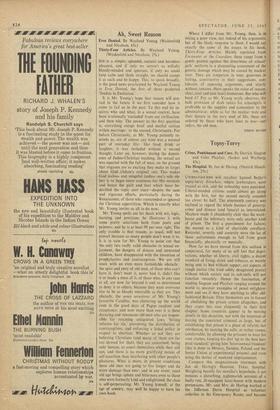Ah, Sweet Reason
Thirty-Four Articles. By Wayland Young. (Weidenfeld and Nicolson, 25s.) SEX is a simple, splendid, natural and harmless pleasure, and if only we weren't so wilfully bloody-minded and ignorant, if only we could keep calm and think straight, we should accept it as such and be happy. This, to speak broadly, is the good news proclaimed by Wayland Young in Eros Denied, the first of three projected `Studies in Exclusion.'
It is Mr. Young's hope that reason will pre- vail in the future if we first consider how it came to fail us in the past. To this end he in- quires who and what, in a sexual context, have been irrationally 'excluded' from our civilisation, and then why. The answer to. the first question is, everything except brief and dutiful coition within marriage: to the second, Christianity. For before Christianity, as Mr. Young patiently re- minds us, sex of almost any kind was a normal part of everyday life: like food, drink or laughter, it was included without a second thought. Later on, however, during the domin- ance of Judteo-Christian teaching, the sexual act was equated with the fall of man, on the ground that orgasms are so exciting they make us forget about God (Adam's original sin). This makes God jealous and vengeful (unless one's sole ob- ject is to beget more creatures for His service); and hence the guilt and fear which have be- devilled the topic ever since—despite the sane and vigorous efforts, particularly during the Renaissance, of those who transcended or ignored the Christian superstition. Which is exactly what Mr. Young invites us all to do now.
Mr. Young spells out his thesis with wit, logic, learning and precision; he illustrates it with some pretty selections both from poets and painters; and he is at least 99 per cent right. The only trouble is that reason, as usual, will not prevail because so many people don't want it to. It is in vain for Mr. Young to point out that the only two really valid obstacles to sexual en- joyment, the dangers of disease and unwanted children, have disappeared with the invention of prophylactics and contraceptives. We are still stuck with an even more formidable obstacle: the spite and envy of old men, of those who can't have it, don't want it, never had it, didn't like it or made a mess of it, of those who, in any case at all, are now far beyond it and so determined to deny it to others, because they want everyone else to be as bloody miserable as they are. This obstacle, the senes severiores of Mr. Young's favourite Catullus, was cluttering up the world even in the good days of Pagan candour and acceptance; and now more than ever it is these decaying and venomous old men who are respon- sible for retaining antiquated laws, 'hitting reforms for six,' preventing the distribution of contraceptives, and enforcing a lethal policy in respect to abortion. Whether or not they are believing Christians (and many of them are far too shrewd for that), they are concerned, being only human, to assert themselves while they still can, and there is no more gratifying means of self-assertion than interfering with other people's pleasures. What is more, in present conditions these old men are going to live longer and do more damage than ever; and in any event, since old age brings spleen and bitterness even to those who were formerly kind and enlightened, the class is self-perpetuating. Mr. Young himself, at the age of seventy, may well be happy to burn his own book.
Where I differ from Mr. Young, then, is ill a taking a poor view, not indeed of his arguments; but of the likely response to them. I would sa exactly the same of the essays in his book, Thirty-Four Articles. Mainly reprinted front o: Encounter or the Guardian. these range from a
gentle protest against the dreariness of school- C' girls' uniform to a disquieting assessment of the fi
genetic damage which may be caused by nuclear, tests. They are temperate in tone, generous in feeling, constructive in their suggestions, con- Siderate of opposing arguments, and utterly without rancour. Here speaks the voice of reason,;; a clear, cool and (not least) humorous. But who will, heed it? For as Mr. Young wryly observes, the bulk provision of drab tunics for schoolgirls is t.
profitable to the supplier and convenient to the administrator; while as for the nuclear tests and their threats to the very seed of life, these ar ordered by those who have least to lose—oq rulers, the old men. SIMON RAVEN






































 Previous page
Previous page